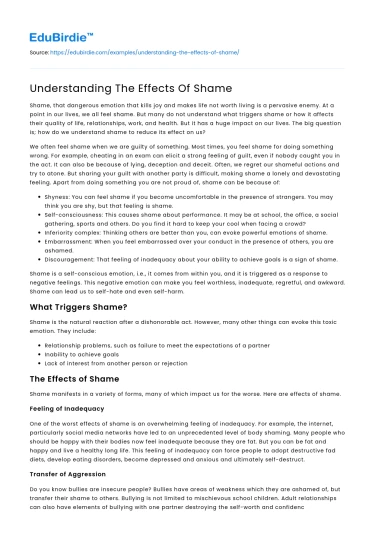Shame, that dangerous emotion that kills joy and makes life not worth living is a pervasive enemy. At a point in our lives, we all feel shame. But many do not understand what triggers shame or how it affects their quality of life, relationships, work, and health. But it has a huge impact on our lives. The big question is; how do we understand shame to reduce its effect on us?
We often feel shame when we are guilty of something. Most times, you feel shame for doing something wrong. For example, cheating in an exam can elicit a strong feeling of guilt, even if nobody caught you in the act. It can also be because of lying, deception and deceit. Often, we regret our shameful actions and try to atone. But sharing your guilt with another party is difficult, making shame a lonely and devastating feeling. Apart from doing something you are not proud of, shame can be because of:
Save your time!
We can take care of your essay
- Proper editing and formatting
- Free revision, title page, and bibliography
- Flexible prices and money-back guarantee
- Shyness: You can feel shame if you become uncomfortable in the presence of strangers. You may think you are shy, but that feeling is shame.
- Self-consciousness: This causes shame about performance. It may be at school, the office, a social gathering, sports and others. Do you find it hard to keep your cool when facing a crowd?
- Inferiority complex: Thinking others are better than you, can evoke powerful emotions of shame.
- Embarrassment: When you feel embarrassed over your conduct in the presence of others, you are ashamed.
- Discouragement: That feeling of inadequacy about your ability to achieve goals is a sign of shame.
Shame is a self-conscious emotion, i.e., it comes from within you, and it is triggered as a response to negative feelings. This negative emotion can make you feel worthless, inadequate, regretful, and awkward. Shame can lead us to self-hate and even self-harm.
What Triggers Shame?
Shame is the natural reaction after a dishonorable act. However, many other things can evoke this toxic emotion. They include:
- Relationship problems, such as failure to meet the expectations of a partner
- Inability to achieve goals
- Lack of interest from another person or rejection
The Effects of Shame
Shame manifests in a variety of forms, many of which impact us for the worse. Here are effects of shame.
Feeling of Inadequacy
One of the worst effects of shame is an overwhelming feeling of inadequacy. For example, the internet, particularly social media networks have led to an unprecedented level of body shaming. Many people who should be happy with their bodies now feel inadequate because they are fat. But you can be fat and happy and live a healthy long life. This feeling of inadequacy can force people to adopt destructive fad diets, develop eating disorders, become depressed and anxious and ultimately self-destruct.
Transfer of Aggression
Do you know bullies are insecure people? Bullies have areas of weakness which they are ashamed of, but transfer their shame to others. Bullying is not limited to mischievous school children. Adult relationships can also have elements of bullying with one partner destroying the self-worth and confidence of the other to make up for their own weaknesses.
Abuse: Shame can lead to the abuse of self and others. If you are shameful, your children or spouse have a higher risk of becoming ashamed of themselves, partly through your conduct.
Negative Emotions
As said earlier, shame can cause a wide range of negative emotions such as anger, rage, hatred, depression, anxiety, loneliness, sadness and more. It can lower your self-esteem and reduce your self-confidence.
The best way to deal with shame is to identify the trigger. It may be a childhood experience, but shame usually manifests from learned experiences. If you feel a strong emotion about yourself over something, note it. Are you self-shaming? The ability to track episodes of shame and the preceding event will go a long way to help you deal with the problem.






 Stuck on your essay?
Stuck on your essay?

